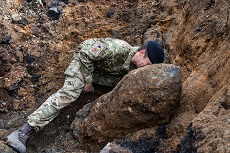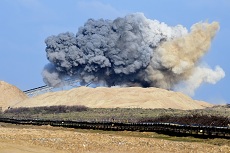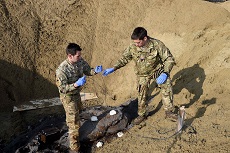A Blast From The Past
Army bomb disposal experts used Brett Aggregates' Cliffe quarry site for the safe detonation of an unexploded Second World War bomb
Brett Aggregates' Cliffe quarry found itself at the centre of a major operation on March 25th when army bomb disposal experts used the site for the safe detonation of an unexploded Second World War bomb unearthed in Bermondsey, South London.
The 250kg bomb which had been dropped by the Luftwaffe during the Blitz in 1941, was discovered on Monday 23rd March by workmen on a building site in a highly populated area of Southwark and was said to pose ‘significant risk’ to life, causing the emergency evacuation of around 1,200 local residents.
The police set up a 200m exclusion zone around the device and the local leisure centre was set up as a temporary shelter for those evacuated from their homes. Residents were asked to find accommodation outside the area with friends or family or to move into temporary lodgings provided by the council.
An army bomb disposal team from Shorncliffe Troop 11 Explosive Ordnance Disposal Royal Logistic Corps was brought in to manage the situation and it was soon clear that the bomb would cause a great deal of damage if it were detonated where it was found - it had to be defused and moved from the site to a place where it could be destroyed without risk to life or property.
A bunker of sandbags was built around and over the device to reduce the impact, should it accidentally detonate in situ, and sappers from 33 Engineer Regiment Explosive Ordnance Disposal dug a trench around the bomb to give them access to the fuse, which was awkwardly positioned on its underside. The teams, who have previously worked on Improvised Explosive Devices (IEDs) in Afghanistan and Northern Ireland, worked through the night to make the device safe to move.
Nick Brabyn, Area Operations Manager at Brett Aggregates takes up the story: “The army bomb disposal group have been to our Cliffe site previously to dispose of marine dredged items, so they know our facilities and the security of the site well. We initially received a request from the army team on the morning of Tuesday 24th, then it was all hands on deck. The site's Chargehands - Keith Tupper, Tony Payne and John Snazle did a great job in preparing the site for the bomb's arrival and informing local residents that the army would be detonating the device.”
The bomb was loaded into a steel container, covered with tonnes of sand and driven to Brett’s Cliffe site by road under Metropolitan Police escort arriving around 7pm.
“A bund was built around the bomb and an 800m cordon was set up, with sentries posted on the access road to the jetty area and all adjoining footpaths to prevent any access,” continues Nick. “Although the bomb was buried in a blast pit and covered in sand to deaden the explosion, the blast could be heard more than ten miles away.”
The device was detonated by Sergeant Ed Clinton and Sergeant Rich McKinnon, of 11 EOD Regiment, Royal Logistic Corps using two kilograms of high explosives. They placed charges on the bomb and then drew back to a safe area 500m away to trigger the controlled explosion.
Warrant Officer Class 1 (SSM) John Lester QGM of 11 EOD Regiment RLC, who headed up the team comments: “The support that Brett Aggregates provided during the disposal of the German WW2 Bomb was invaluable. The business of the safe disposal of unexploded munitions is a complex task, conducted in the UK in support of the Police, there are many aspects that have to be managed to the finest detail.
“Working with Brett during this latest operation made this task a much simpler one. The support afforded by the company was second to none, the positive attitude from both management and the individual site workers was evident throughout. I don’t believe we could have received this support anywhere else. Once again I extend my appreciation to Brett Aggregates for all of their exemplary support given to us; many thanks.”
“We were pleased to have been able to help bring this dangerous situation to a safe and satisfactory conclusion,” says Nick.






